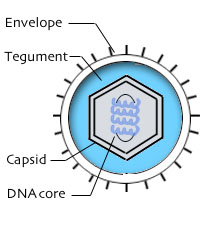Bovine Herpesvirus 1: Difference between revisions
No edit summary |
|||
| Line 27: | Line 27: | ||
==Reproductive Cycle of Bovine herpesvirus 1 in a Host Cell== | ==Reproductive Cycle of Bovine herpesvirus 1 in a Host Cell== | ||
<br> | <br> | ||
The BoHV-1 virion penetrates the cell membrane via a three step process. First, glycoproteins gB and gC on the virion envelope interact with certain cellular structures, creating a low affinity attachment between the virus and the host cell. Second, glycoprotein gD binds to cell membrane protein nectin-1, an immunoglobin protein. This initiates the third phase, when the virion envelope fuses with the cell membrane, allowing the capsid and tegument to enter the cytoplasm. | |||
==Viral Ecology and Pathology== | ==Viral Ecology and Pathology== | ||
Revision as of 22:27, 13 September 2012
A Viral Biorealm page on the family Bovine Herpesvirus 1
Baltimore Classification
Group 1: Double-Stranded DNA Viruses
Higher Order Categories
Order: Herpesvirales
Family: Herpesviridae
Genus: Varicellovirus
Description and Significance
Genome Structure
Virion Structure of Bovine herpesvires 1

Image source: Los Alamos National Laboratory Bioscience Division.
BoHV-1 has a typical herpesvirus virion structure: the virus's double stranded DNA genome is contained within an icosahedral protein capsid. The capsid is wrapped in a protein complex called the tegument, which is made up of about 20 viral proteins. The tegument connects the capsid with the outer cell-derived envelope, which contains the viral membrane proteins and glycoproteins that are essential for the successful penetration of the cell membrane, including glycoproteins gD, gB, gH, and gL.
Reproductive Cycle of Bovine herpesvirus 1 in a Host Cell
The BoHV-1 virion penetrates the cell membrane via a three step process. First, glycoproteins gB and gC on the virion envelope interact with certain cellular structures, creating a low affinity attachment between the virus and the host cell. Second, glycoprotein gD binds to cell membrane protein nectin-1, an immunoglobin protein. This initiates the third phase, when the virion envelope fuses with the cell membrane, allowing the capsid and tegument to enter the cytoplasm.
Viral Ecology and Pathology
References
[1] Labiuk, Shaunivan L.; Babiuk, Lorne A.; van Drunen Littel-van den Hurk, Sylvia. "Major tegument protein VP8 of bovine herpesvirus 1 is phosphorylated by viral US3 and cellular CK2 protein kinases." J. Gen. Vir. 90 (2009): 2829-39.
[2] Muylkens, Benoit; Thiry, Julien; Kirten, Philippe; Schynts, Frederic; Thiry, Etienne. "Bovine herpesvirus 1 infection and infectious bovine rhinotracheitis." Vet. Res. 38 (2007): 181-209.
Page authored for BIOL 375 Virology, September 2010
